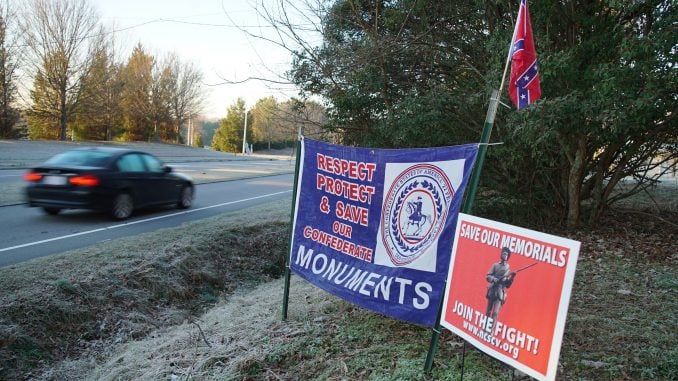
RALEIGH — As Winston-Salem, UNC Chapel Hill and others debate long-standing Confederate memorials, legislative Democrats believe eliminating a 2015 law would allow more flexibility for local control over these monuments. They point to violence in Charlottesville, Va., and unrest in Chapel Hill over “Silent Sam” as evidence officials need more control over symbols at the center of public discontent.
Senate Bill 22, the 2015 law in question, was passed unanimously in the Senate, by both Democrats and Republicans. Upon reaching the House though, S.B. 22 began picking up opposition, with only two votes for and 37 against among the Democrats. It was unanimously approved by House Republicans and easily made it to then-governor Pat McCrory’s desk, where it was signed into law.
“We wanted to preserve North Carolina’s historical items and monuments,” Sen. Jim Davis (R-Macon), an original primary sponsor of the 2015 law, told North State Journal. “There was no specific language on Confederate items. It was about all things of historic significance. Democrats unanimously voted for it in the Senate, so they didn’t see it as controversial at the time.”
The House lead sponsor, Rep. Pricey Harrison (D-Guilford), said she hopes her bill can gain some bipartisan support, but after the comments from Republican leaders, who say a change is unnecessary, she is “not optimistic” it can be passed without a fight.
“I know a lot of North Carolinians see these monuments as reflecting heritage or historical value, and I’m not demonizing them, but we also have to realize that to many others in our state, these monuments represent something deeply offensive, something we need to move beyond,” she told NSJ. “If local governments decide it’s best to remove them, there shouldn’t be obstacles put in their way.”
The week following Harrison’s bill, H.B. 10, being filed, Sen. Paul Lowe (D-Forsyth) filed a Senate companion bill, S.B. 19. In Winston-Salem, in Lowe’s home county, the local government is dealing with its own version of the controversy seen in Charlottesville and Chapel Hill. A Confederate statue displayed at the courthouse has caused debate and occasional vandalism.
The city council has voted to have it moved. The issue has become more complex though, since the United Daughters of the Confederacy, not the state of North Carolina, owns the statue, and the UDC has not been able to produce documents proving their ownership.
“It’s time to move on,” Lowe told North State Journal. “In order to let municipalities make their own decisions on this issue, they need to be given flexibility and not be forced to go through the Historical Commission.”
Lowe said he heard rumors of a Confederate museum being planned near Fayetteville and thought that’d be “an appropriate place for all the statues.”
“It’s definitely a sign of a painful part of the past for many people,” Lowe said. “I think they call that treason when somebody takes up arms to fight their own country. As chair of the Legislative Black Caucus, I can say our caucus has some strong views on this topic.”
When asked if he saw any need to revisit the issue now that Democrats are placing some blame on the law for tying local hands, Davis said, “In the law, there’s an opportunity to follow a process to deal with these issues through the North Carolina Historical Commission, which follows a methodical, deliberate procedure, and that’s a good model. So, I think the present law is serving us well and doesn’t need to be changed.”
On Jan. 31, the House bill was assigned to the House State and Local Government Committee, where, if passed, it will be sent to the House Judiciary Committee. On Feb. 5, the Senate version was sent to the Senate Rules and Operations Committee.
